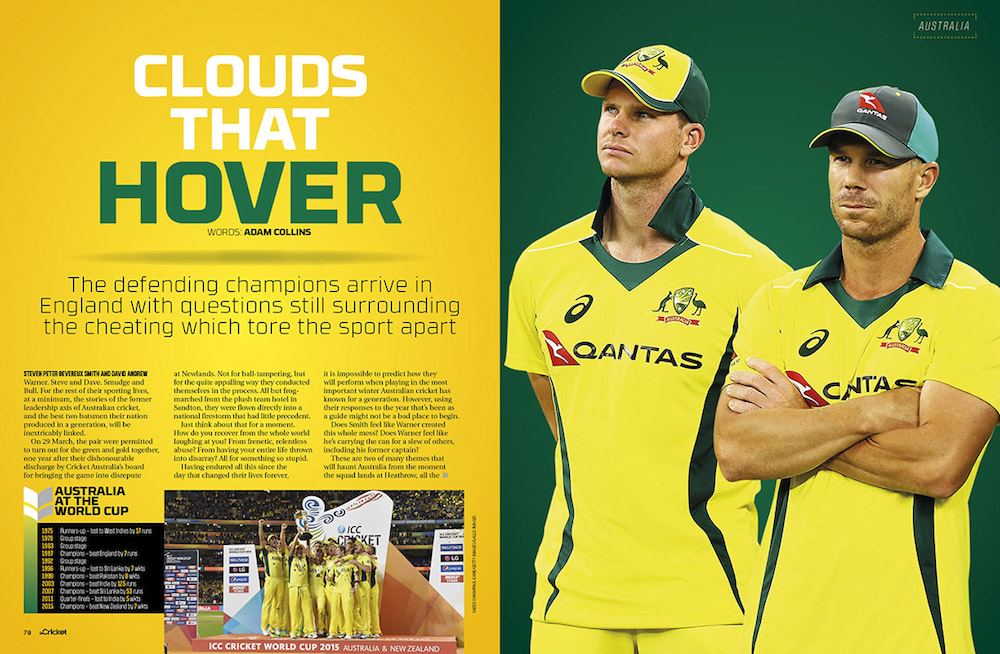The defending champions arrive in England with questions still surrounding the cheating that tore the sport apart.
Steven Peter Devereux Smith and David Andrew Warner. Steve and Dave. Smudger and The Bull. For the rest of their sporting lives, at the very least, the stories about the former leadership axis of Australian cricket, and the best two batsmen produced in a generation for their nation will be inextricably linked.
On 29 March, the pair were permitted to turn out for the green and gold together, one year after their dishonourable discharge by Cricket Australia’s board for bringing the game into disrepute at Newlands. Not for ball tampering, but for the quite appalling way in which they conducted themselves in the process. All but frog-marched from the plush team hotel in Sandton, they were flown directly into a national firestorm for which there was little or no precedent.
Just think about that for a moment. How do you recover from the whole world laughing at you? From frenetic, relentless abuse? From having your entire life thrown into disarray? All for something so stupid?
Having endured all this since the day that changed their lives forever, it is hardly possible to predict how they will perform when playing in the most important tournament Australian cricket has known for a generation. However, using their responses to the past year as a guide might not be a bad place to begin.
Does Smith feel like Warner created this whole mess? Does Warner feel like he’s carrying the can for a slew of others, including his former captain?
These are two of many themes that will haunt Australia from the moment the squad lands at Heathrow, all the way through their World Cup campaign and during the Ashes series that follows.
For Smith’s part, it was a year away from the game that lacked any meaningful distance from it. This was the kid yanked out of high school by his manager on the basis that he could be a superstar. To do so, went the logic of the time, he needed to channel all of himself into the pursuit from that very moment. Everything else could wait or be waved away. For a decade, that’s precisely what he did.
Full commitment brought enormous rewards. In the 53 Tests that Smith played between his breakthrough ton in August 2013 and the ban in South Africa, he averaged 70, tallying a remarkable 23 centuries along the way. But it did come at a cost.
At the end of a truly Bradmanesque Ashes series in 2017-18, he started to fray. Exhaustion spiralled into a lack of control, resulting in complicity at Cape Town when Warner and Cameron Bancroft’s breathless plot came to his attention.
Instead of getting his head out of cricket, Smith jumped straight into the domestic T20 circuit to keep on keeping on. Then in December, back in Australia, he made the abysmal decision to participate in a commercial telephone advertisement. The positive message about mental health awareness was mitigated almost entirely by the fact that he was clipping the ticket with payment for his performance in the commercial. Sure, a well-meaning fella. But again, terribly advised.
The toll the humiliation took on Smith looks heavier than it did for Warner, who through it all has managed to keep his grievances about the process private.
‘Through all the contradictions, he remains the Australian most likely to end up on the front page or dominate,’ these pages foreshadowed when previewing his likely role in the fateful South African series. Because of his experience in the limelight for a wide variety of reasons, there may now be an ingrained quality within Warner that allows him to just get on with life.
To that end, he understands that the public despises him and have done so for a year, at least. He would know how the comments read beneath each story and why so many fans would rather he never again be allowed in the same postcode as the national dressing room. But, crucially, he would realise too that Australia is a nation that craves winning. The loudest voices now lining up to burn him at the stake will be the loudest lauding the comeback story if and when it plays out. Warner gets the deal: shut up, make runs, win (a degree of) forgiveness.
The constituency that will be harder to win over will be inside that dressing room. Reports that bowlers in the Australian side were furious enough with the opener that they were threatening not to take the field with him, had he not been banned for Johannesburg, were denied in unison albeit after two days. However accurate, that the side has been punished collectively for his harebrained idea surely cannot aid team harmony.
At the crease, an elbow injury to Smith (in one of those T20 leagues) demanded surgery to start 2019 – dreadfully timed in terms of building momentum for the World Cup. He could not dominate the Indian Premier League, to the extent the Rajasthan Royals dropped him at one stage.
From a technical perspective, Smith’s game has always been such a finely-tuned one; a balancing act of several unorthodox moving parts. This is why, for as long as his purple patch stretched, opposition bowlers always thought they had a chance to make him look silly. They seldom did, of course. He was blisteringly consistent, especially when it mattered most.
Even so, it was no small thing for selectors to stress that he was playing in the World Cup at the direct expense of Peter Handscomb, who has performed his middle-order role rather nicely in Smith’s absence over Australia’s three ODI series so far in 2019.
The batting part of the reintegration was always likely to be easier for Warner. It looked so easy during his own stint in the IPL: his personality and stubbornness make him more likely to just get the job done. He may be a brawler from way back, but his most effective punches have always been those off the back foot, piercing the gaps either side of point. He made his name clearing the rope at cow corner, but this is a radically different batsman to the one who showed up on TV a decade ago.
But what about the lies?
Yes, these two have been punished in a way that outstrips any ball tampering offence in the history of the game. Sure, they deserve to return to the national team with their sentences served.
But. What. About. The. Lies?
Why hasn’t the full story ever been told? How is it possible a year has elapsed and we know little more than we did in the days after the fact? Little being the operative word. We still know sod all.
It’s not for nothing that Cricket Australia is a taxpayer-funded and subsidised organisation due to the generous way they don’t have to, well, pay any tax at all. No surprise, then, that the stakeholders of the game who exist outside of headquarters – everyday cricket fans – are dissatisfied with the lack of full and frank disclosure.
Ethics aside, it’s an appalling strategy from those who are paid to know better. Allowing the vacuum to expand by giving disingenuous answers about the details being old news and not relevant, only make the particulars more fascinating. Who dreamed up the sticky tape lie? Who was in the room? Crucially: was this the only time that sandpaper had been used… or just the only time that they had been caught? Had these questions, and many others like them, been answered at the time, the rehabilitation process would be so further advanced than it is now.
Instead, all this sits as a bomb just beneath Australia’s World Cup defence. Smith and Warner will be protected species throughout, but what if everything goes wrong? The secrets contained within that Australian dressing room could amount to the most ruinous tinder if the spark is lit. As my colleague, Geoff Lemon, put it best on the day the bans were lifted: ‘Genuine redemption can start with nothing less than the fullest truth. Vaguely gesturing at an outline counts for nothing. But that’s all you can do when the room is still full of ghosts.’
Some 20 years ago, Australia held the World Cup aloft at Lord’s and marked the moment where the team went from the top team in the world to near enough the most dominant the game has ever known for the decade that followed.
Subsequently, too, it was learned the captain, Steve Waugh, and his talisman, Shane Warne, had fallen out. They found a way to make it work. If Smith and Warner can do the same in this edition of the tournament, and win the thing, it’ll make for quite the feature film. Redemption sells.
But until the moment that they tell the truth once and for all, they will remain, as The Strokes sang: ‘Alone, Together.’
This article was written by Adam Collins in the latest issue of SA Cricket magazine.
Photo: Paul Kane/CA/Cricket Australia/Getty Images







